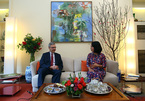He speaks Vietnamese like a Vietnamese native and has attended the Congress of the Communist Party of Vietnam (CPV) four times (5th, 7th, 11th, 13th). Through each Party Congress, he has witnessed Vietnam’s rapid change and development.
 |
|
Palestinian Ambassador to Vietnam Saadi Salama.
|
Not many foreign diplomats have attended up to four Congresses of the CPV like you. What's your impression of those Congresses?
I was a student who studied in Vietnam from 1980 to 1984. In 1982, Vietnam held the 5th Party Congress, and the Palestinian delegation was invited to attend. I contributed a small part to the success of the Palestinian delegation to Vietnam at that time.
The 5th Party Congress was very important because it took place when Vietnam was under economic embargo. The Congress attracted the solidarity and strong support of brotherly parties and the national liberation movement in the world.
Leaders from many countries came to Vietnam to attend the event, such as the representative of the Communist Party of the Soviet Union Mr. Heydar Aliyev, who was later President of Azerbaijan; Mr. Kaysone Phomvihane of Laos; Mr. Heng Samrin of Cambodia and others...
I then returned to Vietnam as Deputy Ambassador. I had the opportunity to attend the 7th Party Congress (1991), when Mr. Do Muoi was elected the General Secretary. Vietnam passed important decisions related to the future, especially innovation policies when Vietnam saw complicated changes in the world.
Leaving Vietnam in 1992 to work in Laos, I still observed Vietnam with a passion for a country where I used to live, study and work.
Fate brought me back to Vietnam at the end of 2009. As the Palestinian Ambassador, I had the opportunity to attend the 11th Party Congress. At that time, the whole world was facing an economic and financial crisis. Vietnam intelligently handled difficulties faced by both the region and the world.
To that end, there were many things that Vietnam accomplished. Firstly, it made and implemented policies associated with the actual development of the country. Secondly, national unity. Thirdly, Vietnamese people always look forward to the future, to common development.
At all Party Congresses, I have noticed that Vietnam's foreign policy is independent. Vietnam is not a member of any coalition. Vietnam expands relations with other countries on the principle of not using force or threatening to use force, but using peaceful means to settle disagreements and to cooperate for mutual benefits.
Those principles of Vietnam have received support from many countries around the world. Therefore, Vietnam’s prestige and position on the world’s political map have been strengthened. I think it is necessary to continue to maintain such a foreign policy.
You have witnessed Vietnam’s development during the 35-year reform process. Can you comment on the change of our country during this period?
I could write a book about this. I came to Vietnam when the country was at its most difficult time. In the 1980s, when I came to Hanoi, I found the city to be very beautiful and peaceful, but the people’s life was hard. All Vietnamese people were the same at that time. Men all wore khaki pants with a white shirt. Women wore black silk pants with a shirt and a conical hat.
Everyone rode a bicycle, went to work from morning and carried with them a food container. People lacked medicine when they were sick and they had a shortage of rice. International students like us at that time even had a better living condition than many Vietnamese leaders, because we were given a lot of priorities.
Yet, Vietnam now ranks second in the world for rice exports and is among the leading exporters of seafood and agricultural products such as coffee, cashew nuts...
In 1980, the tallest buildings in Hanoi were no more than 5 floors, but now Hanoi and Ho Chi Minh City have some of the tallest buildings in Southeast Asia.
Within 35 years of Doi Moi, Vietnam has achieved these successes. Compared with other countries where I have lived and worked, it is a success.
The 13th Party Congress took place recently. What are you interested in the most?
I'm different from other Ambassadors in Vietnam who are interested in personnel. In principle, personnel always play an important role in determining Vietnam's path but I think this is not an important issue. Because so far, no matter who leads Vietnam, the interests of the nation are unified.
Regardless of who leads the country, Vietnam still maintains a foreign policy of promoting relations with other countries, expanding international relations for mutual benefit.
The world is in an unstable situation, with unpredictable level of danger. During the Covid-19 pandemic, Vietnam's GDP increased by nearly 3% while the major countries of Europe and Americas did not have a single point of growth. The production and commodities of Vietnam continue to ensure demand for domestic consumption as well as for export, and workers still have a job….
As a friend of Vietnam, I am always proud of my decision to come to Vietnam to study. I want to send messages to international friends and Palestine about a promising and thriving Vietnam.
Thanh Nam

French Ambassador: Walking to see Hanoi during New Year days is 'fantastic'
This year I will have Tet in Hanoi. On the morning of the 1st day of the lunar New Year I will get up early to walk.